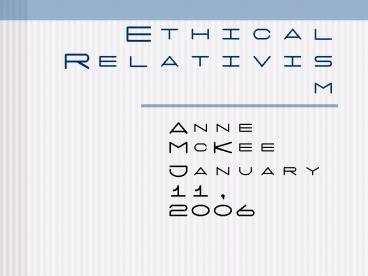Ethical Relativism - PowerPoint PPT Presentation
1 / 15
Title:
Ethical Relativism
Description:
No one has the right to intervene when they think someone else has done something ... Ultimately, there is one and only one right standard of moral evaluation. ... Objectivism ... – PowerPoint PPT presentation
Number of Views:693
Avg rating:3.0/5.0
Title: Ethical Relativism
1
Ethical Relativism
- Anne McKee
- January 11, 2006
2
No one has the right to judge what is right or
wrong for another person
- Strongly agree Agree Neutral/undecided Di
sagree Strongly disagree-
3
What is right depends on the culture you are in.
- Strongly agreeAgreeNeutral/undecidedDisagreeS
trongly disagree
4
No one has the right to intervene when they think
someone else has done something morally wrong.
- Strongly agree Agree Neutral/undecided Disagr
ee Strongly disagree
5
It is hopeless to try to arrive at a final answer
to ethical questions.
- Strongly agree Agree Neutral/undecided Disagr
ee Strongly disagree
6
Ultimately, there is one and only one right
standard of moral evaluation.
- Strongly agreeAgreeNeutral/undecidedDisagreeS
trongly disagree
7
A definition
- Relativism is an ethical position that holds that
what we believe about right and wrong is
culturally or individually identified and
specific, so that it is impossible to say what is
right or wrong across cultural or individual
boundaries.
8
Cultural Relativism
- Whether you are an ethical person is
determined by whether you are following the moral
code set by your group, but it is unfair or
impossible for someone not in the group to make a
true assessment or criticism of your groups
standards.
9
Individual Relativism
- We each are guided by our own conscience,
that what is right for me may not be right for
you, and that I shouldnt criticize or make
judgments about your actions. After all, I cant
stand completely in your shoes, can I?
10
Objectivism
- holds that there is an objective right and wrong,
which we can talk about across cultural and
individual boundaries.
Absolutism
holds that moral rules or principles have no
exceptions, and are context-independent
11
How would relativism address
- Questions of sexual practice?
- Questions of accepting bribes?
- Questions of treatment of prisoners?
- Questions of war?
12
Some good things about relativism
- Stance of humility toward other cultures and
people. - Urges us to look carefully at reasons and values
before rushing to judgment. - Reminds us that many of our own positions are
deeply influenced by the culture we live in, or
by individual experience.
13
Flaws in relativistic outlook
- Tries to assert that what is is what must be.
- Because there are ethical differences, there can
be no objective judgment. - Because we cant agree, there must be no
standard. - Because we cant figure something out, it must
not have a solution.
14
Its also dangerous
- Do you really want a world where no judgment is
possible? - Gang rape
- Hitler
- Where the majority always rules?
- Where there is no possibility of improving
current standards?
15
And, who is your group, anyway?
- Men? Women?
- Americans?
- Blount Countians?
- Maryville College Students?
- Members of a particular ethnic group?
- Members of a religious faith?

